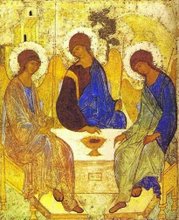God is such a superabundance of love that he wanted to share his love with others, so he chose to create the visible world. All of creation reflects imperfectly the infinite perfections of God. But man in particular, God chose to give a special participation in his being, a special likeness to himself.
So God created man in his own image, in the image of God he created him; male and female he created them. (Gen 1:27) As an individual, man is like God in the rationality of his soul, including his will and his intelligence. God also inscribed on man's heart a participation in his divine Wisdom, known as the natural law, so that he would have a knowledge of the proper ordering of all creation, including himself, to its ultimate End. Communally man bears the image of God in his ability to love another-- not only the love of the male for the female and of the female for the male, but also to love others in general. Perhaps the greatest of all of God's gifts to man was a share of his own divine life so that man would have the ability to do what only God is capable of doing: loving God with the infinite love of God.
God set man over the world over it to rule it and to participate, though in a limited way, in God's own creativity by ordering the world through his work:
The LORD God took the man and put him in the garden of Eden to till it and keep it (Gen 2:15)
God made the world good (cf. Gen 1:31). Unfortunately, man freely chose to disobey the commandment of God. Man chose himself over God and thus sin entered the world (cf. Gen 3). Sin, which is a rupture of man's relationship with God, takes from man the filial image of God that enabled him to love God and to share in God's eternal happiness. Sin separated man from God. It also brought with it disunity within man himself: man's body rebelled against his soul, so that he was now subject to death, and his soul could no longer exercise perfect dominion over his passions.
The most dominant of his passions was now the desire for sexual union. In the beginning there was no shame: Adam and Eve felt no need to cover themselves (cf. Gen 2:25). After sin, however, the image of God within man, male and female, was obscured, so that he could no longer sense the expression of personal communion of which the body was meant to be the substratum. Sexual differences, instead of expressing the nuptial meaning of the body-- to male and female as gift for each other-- became a source of confrontation and distrust because of the inability of the soul to govern the body (cf. John Paul II. Blessed Are the Pure of Heart, Boston: St. Paul Books and Media, 1983.)
Even now after the fall, spousal love guarded against lust retains the interior freedom of the gift. Spousal love contributes much to man's fulfillment, but it is only a poem of the overwhelming majesty of the love that God has for man, and that God enables man to have for God:
You have made our hearts for yourself, O Lord, and our hearts are restless until they rest in you. (Augustine, Confessions, I, 1)
We are not made merely for human love, but to love God himself! Only the infinite love of God can fully satisfy man's heart.
God wishes good for his creatures, who can only be happy by loving him. So when the fullness of time had come, the Author of all creation showed the depth of his love by entering into the story.
-Augustine Club @Columbia.edu
Subscribe to:
Post Comments (Atom)



No comments:
Post a Comment